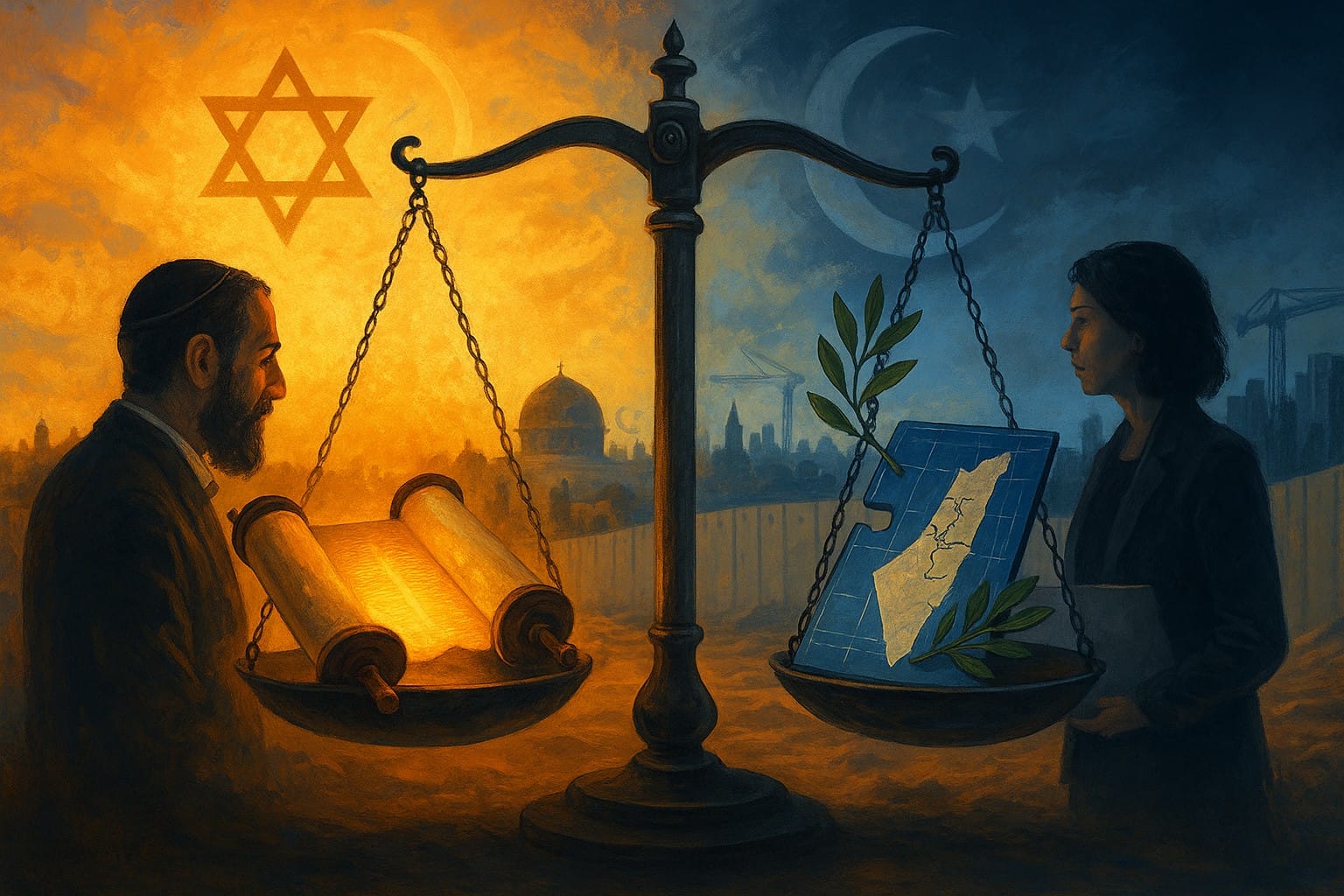
Between Faith and Pragmatism: How Israelis View the Arab-Israeli Conflict in 2025
Nearly two years after the October 7, 2023 massacre, Israeli society remains deeply fractured in its understanding of the Arab-Israeli conflict. A comprehensive survey conducted in June 2025 among over 1,000 respondents reveals a nation caught between religious conviction and pragmatic calculation, torn between hopes for peace and readiness for radical solutions.
Clash of Civilizations or Resource Competition?
The most striking finding centers on how Israelis interpret the fundamental nature of the conflict. One-third of respondents (31.7%) view the struggle as an existential battle between Judaism and Islam—a perspective that transforms a territorial dispute into a civilizational clash. Nearly as many (28.7%) see it as a more prosaic struggle for land.
This dichotomy reflects a deeper fault line running through Israeli society. Religious citizens tend to mystify the conflict, seeing echoes of biblical times—nearly a quarter of ultra-Orthodox respondents (23.1%) believe the roots lie in “the story of Abraham and his sons.” Secular Israelis, by contrast, favor material explanations: territory, economics, colonial legacy.
The divide becomes particularly stark when comparing Jewish and Arab citizens of Israel. While more than one-third of Jews (35.7%) describe an existential religious confrontation, only one in ten Arab citizens (10.6%) share this view. Arab Israelis are nearly three times more likely to identify political-economic roots—understandable given their position within Israeli society.
Iran as Public Enemy Number One
On the question of external actors stoking conflict escalation, Israeli society shows rare consensus. More than half of all respondents (54.5%) name Iran as the primary provocateur—a result reflecting the success of Israeli diplomacy in crafting the “Iranian threat” narrative.
Tellingly, this figure reaches 60.3% among Jewish citizens but only 23.7% among Arabs. Arab Israeli citizens more frequently blame the United States for escalation (19.4% versus fewer than 1% among Jews), revealing starkly different perceptions of America’s Middle East role.
Annexation Goes Mainstream
Perhaps most troubling for peace advocates is the survey’s findings on the future of the West Bank and Gaza Strip. Full annexation of these territories enjoys support from nearly one-third of Israelis (30.8%)—the single most popular position offered. By comparison, creating a Palestinian state garners support from just one in ten respondents (9.5%).
Religiosity proves decisive here. While less than a quarter of secular citizens (23.3%) favor annexation, more than half of the ultra-Orthodox (56.9%) do. This trend reflects the growing influence of religious Zionism on Israel’s political agenda.
The gap between Jewish and Arab citizens is even more pronounced. Among Jews, one in three (34.8%) supports full annexation, compared with just one in ten Arabs (10%). Conversely, nearly 40% of Arab citizens support Palestinian statehood versus fewer than 4% of Jewish citizens.
Peace Seems Impossible
Paradoxically, even annexation supporters don’t believe such policies would bring peace. More than half of Israelis (52%) are convinced that full annexation of Palestinian territories would not resolve territorial disputes. Only a quarter (24%) view annexation as a path to a settlement.
Israelis express even deeper pessimism about prospects for peaceful coexistence. Regardless of whether annexation occurs, most don’t believe in the possibility of lasting peace between the two peoples. With annexation, 62% consider peaceful coexistence impossible; without it, 55.6% still see no hope.
These figures reveal profound pessimism about settlement prospects. People support radical solutions not because they believe in their effectiveness, but because they see no alternatives.
Internal Contradictions
The survey exposes internal contradictions in the public mindset. On one hand, 40.7% expect annexation to negatively impact Israeli society. On the other, support for such policies remains high.
Interestingly, secular citizens more often fear negative consequences from annexation (49% versus 20.6% among the ultra-Orthodox), yet nearly a quarter would still vote for such policies.
Political Prospects
The poll shows Israelis don’t expect dramatic changes if the opposition were to take power. Only 31% believe new leadership would continue Netanyahu’s policies preventing Palestinian statehood, while 44% anticipate changes.
Nearly half of respondents (42.8%) expect annexation to become a central issue in the next Knesset elections. This suggests that growing radicalization may find expression in political competition.
Conclusion: A Society at the Crossroads
The survey results paint a portrait of Israeli society at a historic crossroads. The events of October 7, 2023 appear to have definitively buried hopes for peaceful settlement in its traditional form. Most Israelis no longer believe in two-state coexistence and are prepared to consider radical alternatives.
Yet society remains deeply fractured along religious and ethnic lines. Religious citizens see divine providence in the conflict; secular ones see political necessity. Arab Israeli citizens inhabit a parallel reality where their hopes and fears differ fundamentally from the Jewish majority.
This schism creates dangerous dynamics: politicians may feel compelled to radicalize their rhetoric to retain religious voter support, further alienating the Arab minority and the international community.
The research captures a moment when Israeli society, exhausted by endless conflict, is prepared to consider forceful solutions despite recognizing their destructive potential. This makes the search for peaceful settlement even more complex—but also more necessary.
 English
English
 Русский
Русский עברית
עברית
